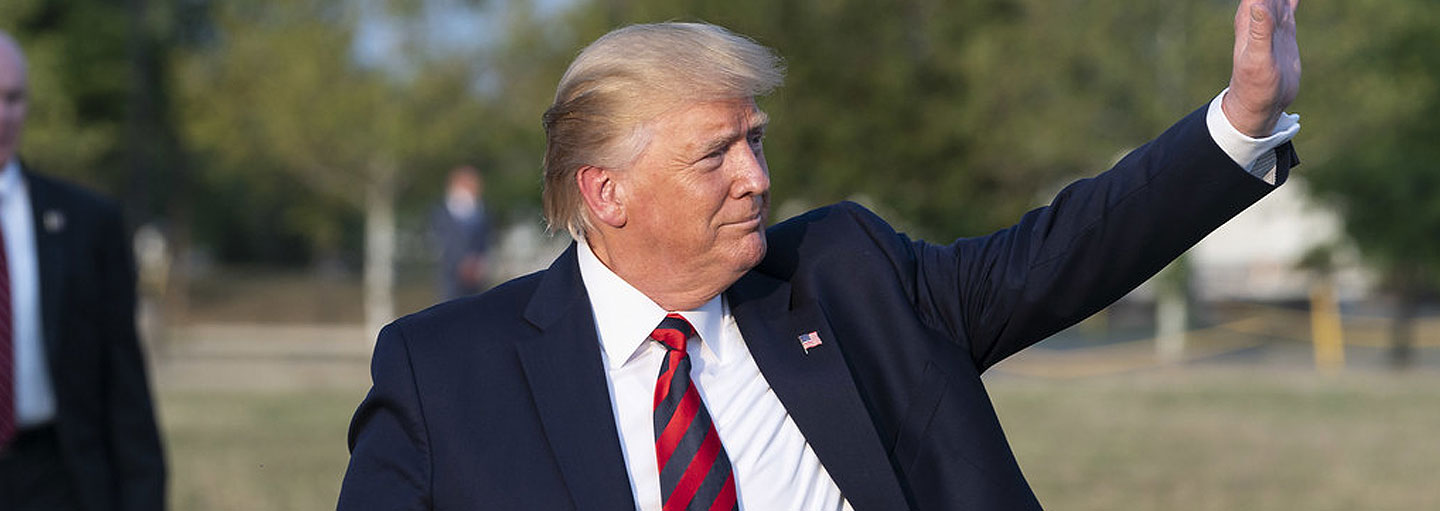Donald Trump’s personal beliefs have been much scrutinised throughout his presidency. Comments Trump made at a recent campaign event have brought this discussion to the fore once again.
Speaking of the threat of the coronavirus, Trump remarked,
You can do everything you want, but you know, you still need help from the boss… Yeah, we need help. It’s alright to say it. Now they’ll criticise me for that: ‘How dare he say that!’ … Nah, I’ll say it…
Somebody said to me the other day, ‘You’re the most famous person in the world by far’. I said, ‘No, I’m not.’ … They said, ‘Who’s more famous?’ I said, ‘Jesus Christ’.
Americans are widely known for invoking God in public forums to appeal to a fading but still widespread cultural belief in God. For that reason, many will doubtless dismiss the president’s recent remarks as pandering. But it is notable that Trump referred not just to God but to Jesus Christ, clearly identifying himself with the nation’s 200 million professing Christians.
A common dismissal of Trump’s faith centres on his conduct before entering office. It’s no secret that Trump was an audacious billionaire from liberal New York who has a history of sexual immorality and a string of broken marriages. To some Christians, these sins are unforgivable.
In the present, perhaps Trump’s most condemned trait is his big-mouthed brashness. At times, this is excusable: there are many biblical precedents for a strong verbal game when facing devious enemies. Other times, however, Trump’s words are unkind and unnecessary, and anyone can see it.
An obvious statement that can be made about Donald Trump’s Christianity is that he’s a fairly lousy ambassador for it — at least as far as charm and amiability is concerned.
But we should bear in mind that one’s Christian witness consists in more than just this. Trump’s rival Joe Biden, for example, has a more agreeable personality, but is an advocate of abortion up to birth for any reason; a holocaust that he wants American taxpayers to fund. Compared to Trump (who is easily the most pro-life president in living memory), that’s horrifically un-Christian of Biden, who is a professing Catholic.
In other words, the sincerity of someone’s faith is measured by more than just a polite exterior.
In terms of Donald Trump’s spiritual heritage, his family traces their roots back to the Hebrides revival in 1950s Scotland. He was raised and confirmed in the Presbyterian Church and has shared that his parents “taught me the importance of faith and prayer from a young age.”
In more recent years, Trump has begun to identify as a “non-denominational” Christian — a term often used by Americans to denote a big-tent evangelical-charismatic faith common to larger churches.
President Trump has welcomed pastors, worship leaders and other Christian leaders into the White House to hold “faith briefings”, and is known to allow worship services to take place within its walls — something very unusual for a president in modern times.
I had the opportunity to personally meet with former Kansas Governor Sam Brownback, who is now part of the Trump administration in the role of Ambassador at Large for International Religious Freedom. Brownback explained to me that Donald Trump is a man with a deep respect for religious faith, and that he has surrounded himself with more Christian believers than any recent president.
And the results of this are showing. Trump has worked overtime to appoint 220 judges, including three Supreme Court justices, who will interpret the constitution as written, guarding Christian values for generations to come.
On more than one occasion, he has confronted the powers-that-be at the United Nations, rejecting their pro-abortion, elitist-globalist policies — and taking a sensible stand on nationalism and freedoms like speech and religion that are under threat in many parts of the world.
Trump is the first president in 40 years to start no new wars, and he has struck historic peace deals in the Middle East that have eluded past leaders — all the while being unashamedly pro-Israel in prose and policy.
In the face of a rising radicalism that berates the West as irredeemably racist and that seeks to supplant the gains of the civil rights movement with new, ugly forms of racism, Trump has hit back hard. He has instead affirmed the progress that America has made for equality, and the importance of celebrating this, countering the radicalism, and staying the course to ensure equal treatment for all.
In defiance of unfounded accusations that he is a racist, Donald Trump has worked hard with the Black community, breaking records for Black unemployment, funding historically Black colleges, and prioritising prison reform. If the polls for the upcoming election are accurate, Trump may win the highest Black vote of any Republican in decades.
All of this Trump has achieved at considerable financial loss to himself. He has seen his personal empire devalued by $1 billion during this time, and has chosen to donate his quarterly $100,000 salary to charities helping the sick, veterans, farmers and children.
Yes, Trump has no filter when he tweets, and he has a big, boastful mouth to match. But much of his conduct — at least in terms of what he has achieved for everyday Americans and for those most in need — is credibly Christian. And arguably, it is the very characteristic that so many dislike about him — his take-no-prisoners bullishness — that has enabled him to advance Christian causes with no care for the vitriol of his critics.
Trump is no poster-boy for Jesus. And who really knows where his heart is at? But he has provided more than a few reasons to be taken seriously in his fumbling attempts to follow Jesus.
This article was originally published by The Canberra Declaration.





















